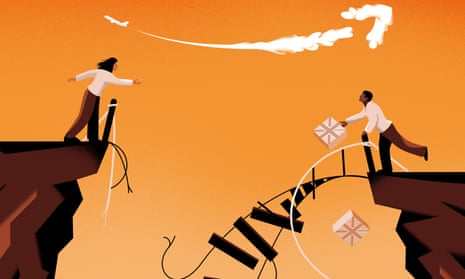If you had to design a scenario guaranteed to fatten up big business while squashing the rest of the economy, it would probably resemble what Britain is living through.
Thousands of independent businesses are shuttered up. Amazon and the big supermarkets, boosted by the suspension of anything other than “essential” retail but gleefully selling a huge range of stuff, have carved up consumer spending between them. And the economic impact of Covid-19 is now fusing with an issue that will endure even as lockdown restrictions are eventually eased: the dire effects of Brexit on smaller companies staring into the future with a mixture of fear and bafflement.
Amid the pandemic, there is not much room for this story to intrude. But week by week, things are starting to become clear. Figures to be published today in the latest Manufacturing Barometer survey of small and medium-sized firms show that two-thirds of such companies have seen negative price changes in their supply chains since leaving the EU. A majority, meanwhile, have seen post-Brexit “complications” with both exporting and importing. Roughly a week ago, it was reported that exports going from the UK to EU countries via British ports were down 68% year on year. By summer, the burgeoning crisis that all of this highlights may have burst into the political foreground.
Last week, I talked to people who make their living in the UK’s fashion and clothing industry. Their trade is reckoned to be worth around £35bn a year to the UK economy, and is routinely at the forefront of British trade missions and export drives. But with the once-simple business of selling into Europe now a matter of huge complexity, small companies that were already having to deal with Covid restrictions are facing a set of impossible obstacles.
After three days of trying to comprehensively understand the new rules governing UK-EU trade, I can safely say that it gives you the mother of all headaches. Among the most basic changes are “import VAT” now being payable in the countries where exports are delivered, some goods being subject to customs duties, and even the most basic transactions suddenly being synonymous with onerous paperwork, “disbursement charges” and hiked courier fees. Multinationals can just about cope with these things, but small businesses are mired in no end of problems. Some have been forced to put up the prices offered to customers in EU countries by as much as 30%; others have put up notices online bluntly telling people that they are “unable to fulfil orders to Europe”.
Ben Taylor, 29, is the co-founder of the knitwear company Country of Origin – a proudly ethical firm that directly employs four other people and has a stake in a factory in Leicestershire, where around 15 others work. Around a third of the company’s turnover, he told me, came from trade with people in EU countries, many of whom are individual customers buying sweaters online. “It’s been absolutely disastrous since Brexit,” he said. “We’d been doing quite big numbers, but they’ve declined rapidly.”
He reckoned that every one of a few hundred European orders since the new year had fallen victim to some issue or other involving customers having to pay eye-watering extra charges. One punter in the Netherlands, for example, had recently bought a sweater, only to be billed €100 (£88) for “government fees”. So as not to alienate people, his company was reimbursing anyone hit with these extra charges, but that clearly cannot go on indefinitely.
“There’s absolutely no benefit right now in us trading with Europe,” he said. “Which is ridiculous.”
Half an hour later after talking to him, I was on a Zoom call to Anna Foster, the creator of a trailblazing, two-person company called ELV (it stands for East London Vintage) that makes high-end jeans using recycled denim. The pandemic, she said, meant that conversations in early 2020 about stocking her clothes with big British retailers had been put on hold; Brexit had now ensured that the same had happened with potentially promising trading partners in Europe. And then there was the mess of arcana that surrounds even basic dealings with people on the continent. “Everyone’s going to have get a Brexit adviser to come in, like a health and safety person,” she marvelled.
I also spoke to Kenneth Mackenzie, who has owned and run his clothing brand 6876 since 1995. He was full of stories that illustrated the mind-boggling contrasts between trading as part of the single market and braving life outside it. Some European clothes manufacturers, he said, were starting to conclude that the complexities of trading with the UK meant they could no longer use British-made fabrics. But for now, the most vivid change to his business was the fact that European customers could no longer do things that, until the end of 2020, had been simple.
“The internet was meant to open things up, so you could be in Stockholm looking for something in a shop in Manchester, and there was no difference from buying it off a guy 10 miles down the road,” he said. “Now that’s gone.” Recently, going into the guts of his online ordering system had turned up scores of half-completed orders, a telling number of which seemed to have been started by people in EU countries, only for them to have realised the complications and given up.
If the government wants us to somehow buy and sell our way out of the Covid slump, it is going to need agile, inventive companies such as these. Given that they operate at the meeting point of business and popular culture, they also have a big part to play in how post-Brexit Britain might re-sell itself to the world. There was a time, perhaps, when leading Conservative politicians understood this kind of stuff as a matter of instinct. But just as Labour has become estranged from its old working-class heartlands, so the Conservatives’ embrace of a parochial, introverted kind of populism means they can no longer claim to be the party of commerce. That is a seismic change, and it may sooner or later transform our politics.
For the moment, all this is obscured by the daily news about the virus. But the facts are plain enough. Tesco and Amazon alone will not save us from the economic effects of Covid, nor the consequences of leaving the EU. Moreover, it is not big companies that take the economy in new directions, but the kind of small firms and startups hidden away in workspaces, trading estates and shops that are currently closed. With the sense that time is fast running out, the people who devote their lives to them are wondering how on earth we got in this mess, and who might eventually come to their rescue.
John Harris is a Guardian columnist

